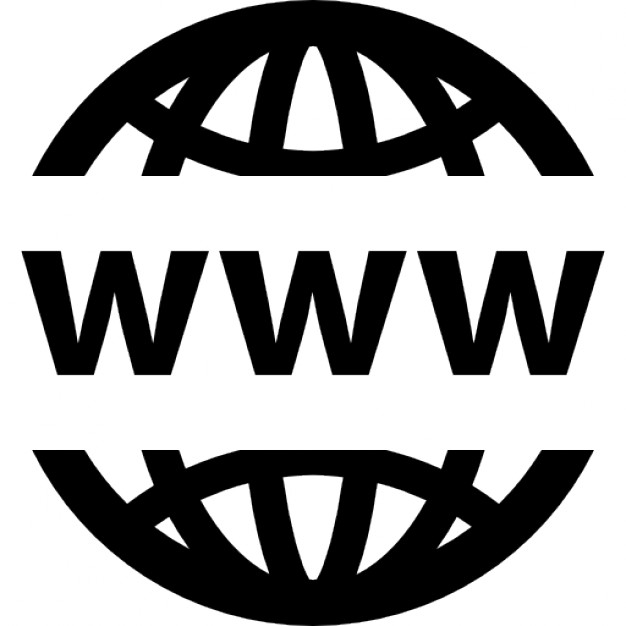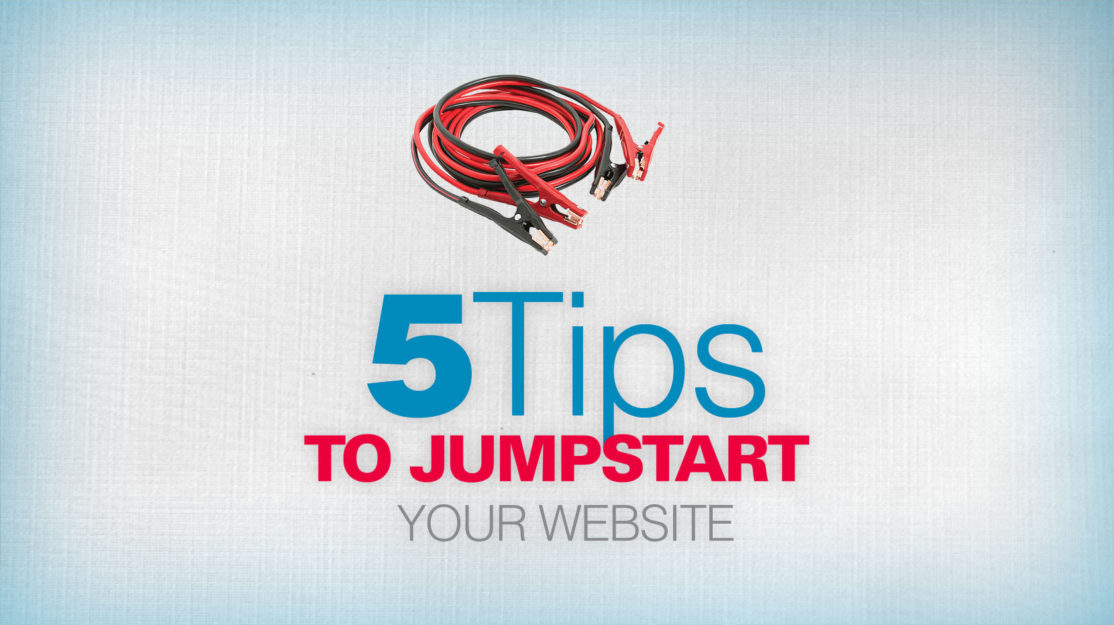Starting a new website can be a daunting task, if you allow it to be.
When you jumpstart your website correctly, it minimizes future website headaches. With the help of a professional, or if you’re a great DIY’er, these tips will jumpstart your new website the right way, the first time!

1.) Find a Domain Name
– When a domain name is short and easy to remember, it can add to a seamless user experience.
Some businesses, organizations and personal names (life coaches, creatives and the like) are long, and that’s understandable. In this case, find an abbreviated version. For example, if your business name is Xavier’s Exuberant Exercise Class, then you may want to find xeec.com or a shortened version that’s easy to type and remember. What if Xavier decided to use his entire business name as his domain name? Can you imagine someone trying to type in that long, complicated domain name? They’d probably mess up the “Ex” combination and spelling more than a few times! Then there’s…
FRUSTRATION. Let’s see what their competitors have to offer!
- If you can’t find any acroynyms for your domain name, write down different versions of your business, organization or personal name shortened, and pick the top 2-3, abbreviated versions. Whatever rolls off your tongue easily, will probably be the best choice.
Once you find that perfect (or close to it) domain name, register it IMMEDIATELY!
If you wait, it may not be available anymore and that’s such a heart break, especially if you’ve really taken the time to figure out the perfect domain name. Remember, try to keep the domain name simple and if it’s available for register, do it right away! Think of it as owning a prime piece of real estate on the internet.
Lastly, register your domain name for more than 2 years.
You’ll get a better deal with multi-year (3 or more) registration. It helps establish your domain name authority. This simply means, it gives search engines time to recognize your domain name and also increases search engine ranking and optimization.
![]()
2.) Website Content
– The hardest thing for busy people to do (and most of us are) is take the time to try and figure out what web pages are needed, and then developing the content for each.
Most smaller businesses and organizations may not deem hiring a copywriter a necessity or just don’t have it in the budget. DIY is the obvious choice (and I’m sure you’re a good writer).
- Follow these steps to start developing your website content:
Research your competitions website(s) and even others not in your industry to see how their information is organized to get content ideas. However, DON’T copy. Mimicking someone’s content is good as long as you add your touch to it. Remember, you want to show why and how you are different from your competition.
Decide on the pages you need for your website. These pages typically make up the navigation of your website. HOME | ABOUT | SERVICES | CONTACT, etc. Your content will depend on the service or products you are offering.
Swiss Cheese your content. In other words, poke holes in completing each section individually. For example, you may do the ABOUT US page this week, the SERVICES page next week, so on and so forth. However you do it, make developing great content a priority. It affects your search engine accessibility and results. It also keeps your visitors engaged with the ultimate goal of closing the sale of a product or service.
Consider professional, custom photography. Professional, custom photography visually enhances your website 1000 times more. It allows your graphic/web designer to work with a professional photographer to dictate composition, look and angles that help with your overall brand. It’s especially important if you need product or model shots. Professional photography usually costs more, but the investment and uniqueness of your brand
is worth it.
Stock photography can work well too! Be careful in picking photos that don’t look so “canned” or don’t relate to your product/service or even where you are located. Using mountains in a photo when there are no mountains where you live, is deceiving. Pulling photos and/or text from Google can cause copyright infringement or trademark issues if your website is found to use images that are protected by trademark or copyright laws. You don’t want that on your hands. It could lead to lawsuits, your brand being tarnished, etc.
This step is usually the most difficult and time consuming if you haven’t already thought deeply about your brand message. It takes a commitment from you to do it right. Graphic/Web Designers, Brand Strategist and Marketing consultants can give you all the guidance in the world, but only you truly know your vision for your business or organization.

3.) Hosting Providers
– There is a sea of hosting providers to choose from.
I’ve worked with clients who have their domain name registered with one provider and their website hosting with another. It’s great practice to register and host your domain with the same provider. That way, if you have any issues, it makes it a lot easier to get support.
Don’t get overwhelmed by the many hosting providers that are out there.
If you have no clue as to where to start with choosing a hosting provider, my recommendation is to hire a professional to help you (That Creative Guy! Ha!). Most times, how you want your website to function can be the deciding factor on a hosting solution.
I’ve worked with a number of different hosting providers. If a client does not have a hosting provider, I recommend GoDaddy (personal preference). I’m very familiar with their setup and they have always given good customer service. Some web designers/developers would debate this. However, it’s all really based on the hosting provider your web designer/developer is comfortable using. As long as they give you the best solution and you allow them to maintain your website after launch, that’s the most important thing. There are other factors to consider regarding hosting providers, that should be explained to you by your web designer/developer. Remember to ask questions!
Here are some web hosting providers I’ve worked with:

4.) Domain Registration
and Hosting Renewals – After you’ve purchased your domain and hosting, keep up with your domain and hosting registration renewals! This one is a biggie!
Above, I mentioned registering your domain and hosting with the same provider. As stated in tip #1 your domain name is prime real estate. It’s like buying a prime piece of land on the internet.
You can ALWAYS find hosting, but you can’t always find that perfect domain name. So, don’t lose it!
There have been a number of instances, from my experience, where clients have allowed others (more so individual freelancers) to register their domain and hosting for them. After the website was designed and launched, they tried to contact the freelancer(s) after a year or so, to transfer the domain to someone else, another company or themselves. Unfortunately, they were nowhere to be found. You’ll find yourself having to register a new domain name (after you spent so much time finding the perfect one) and possibly recreating your website.
Life Happens.
Sometimes we simply forget, even after we see the renewal notices and don’t take action right then. Uncontrollable circumstances can/may arise that unintentionally cause a freelancer’s unresponsiveness like a terminal illness, career change, etc. More importantly, research and make sure you don’t connect with a freelancer who does shady business. I’ve worked with clients who’ve been through that.
- If you’ve registered the domain and hosting yourself, don’t ignore the renewal emails or you may forget to renew and get that “oh so rude awakening” that your website is down, not from being compromised, but non-renewal of your domain and/or hosting.
- I suggest, if you use a freelancer (unless you know them as reliable and ethical) register your own domain name to be sure you own and have control of it.
- Keep in constant, consistent communication with your freelancer to be sure things are ok.
- Even if you go with a larger design firm, the same applies. Some firms may charge a fee to have you transfer your domain name.
- Make sure you stay on top of these things so you’ll always know what’s going on with your domain and hosting!

5.) Backup your website! – Most websites are now built on frameworks like WordPress, Squarespace, Drupal or DIY template setups.
Above, I mentioned registering your domain and hosting with the same provider. As stated in tip #1 your domain name is prime real estate. It’s like buying a prime piece of land on the internet.
It’s imperative that you backup your website consistently. Whether it’s an informational, eCommerce or website that stores critical information your business or organization will need, backups are mandatory.
This is not a luxury, but a critical component of making sure your website can be restored if it is compromised in any way.
Most hosting providers have several backup options. The best ones are real-time backups, which mean any change you make to a website is backed up right then. You’ll always have the LATEST version of your website if it needs to be restored. Other options like daily backups work well too, depending on how often you make changes to your website. Just imagine losing a ton of online orders and not being able to recover them? Backing up your website is one thing you can’t shrug off.
See tip #3 for some hosting provider options that have backup solutions!
BONUS TIP
Purchasing a SSL certificate and giving your website an extra layer of security is a great way to help boost your search engine rankings and keep your website safe. If you use any type of online form submission where people enter their information and submit it, SSL is a must have.
Websites with HTTPS, are considered secure and used as a signal for Google to find secure websites. If you shop online, you usually see this with a green lock and “Secure” (in some browsers) in your address bar. For a long time, this was just used for websites which needed personal information submitted like credit card numbers, SSN’s, EIN’s, etc.
Now, with the increase in online attacks, you must strongly consider securing your website. Also, as we see brick and mortar retailers close, they are transitioning to a more focused, online presence. In turn, secure websites will be more of a mandate than an option. Google is penalizing websites for not having an SSL Certificate. Your website will be dropped in its search engine rankings and also be labeled as an “unsecure site”. Right now, it’s not mandatory to get an SSL Certificate, but you can bet, within the next few years, there’s a strong possibility they will be. SSL certificates can be expensive depending on which kind you purchase. Ask a professional about the different types or ask your hosting provider.
You need these tips in your life. So, click here to download the pdf file and have it handy to help you jump start your website the right way, the first time!







